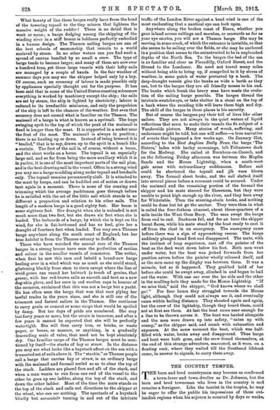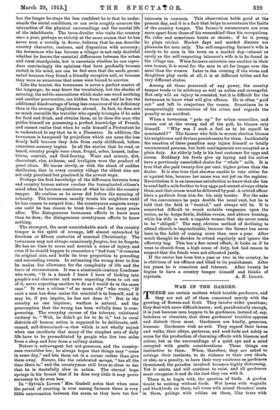THE COUNTRY TEMPER.
THE born and bred countryman may become as confirmed a town-lover and town-dweller as Dr. Johnson, but the born and bred townsman who lives in the country is and remains a foreigner. Like the tourist in the tropics, he may be eager to offer the public his impressions of these out landish regions when his sojourn is counted by days or weeks, but the longer he stays the less confident he is that be under- stands the social conditions, or can even roughly measure the interaction of the physical surroundings and the mental life of the inhabitants. The town-dweller who visits the country once a year, perhaps so strictly at the same season that he has never seen a cowslip in flower, believes that he can describe country character, customs, and disposition with accuracy ; the townsman who has become a villager is not only doubtful whether he knows the essential differences between the urban and rural standpoints, but is uncertain whether he can repro- duce convincingly the opinions that have gradually become rooted in his mind, nor can he feel sure that the seeds germi- nated because they found a friendly receptive soil, or because they were so numerous that some were bound to survive.
Like the tourist, the townsman is never a perfect master of the language; he may know the vocabulary, but the shades of meaning, the subtle associations which make one word soothing and another provocative, are hidden from him, and he has the additional disadvantage of being less conscious of the deficiency than is the average Englishman abroad. In fact, he does not so much resemble the traveller who openly triumphs if he asks for food and drink, and obtains them, as he does the man who prides himself on possessing a perfect knowledge of French, and cannot realise that when he calla himself a Protestant he is understood to say that he is a Dissenter. In addition, the townsman is hampered by prejudices which are none the less firmly held because they date from early childhood, before conscious memory begins. In all the stories that be read, or heard, country people were clean, frugal, sober, honest, indus- trious, content, and God-fearing. Want and misery, dirt, discontent, vice, sickness, and irreligion were the product of great cities. He learns slowly, or with the shock of sudden disillusion, that in every country village the oldest sins are not only practised but practised in the newest ways.
Perhaps the first knowledge of the difference between town and country human nature reaches the transplanted citizen's mind when he becomes conscious of what he calls the country temper. He realizes as he never did before the meaning of urbanity. The townsman usually trusts his neighbour until he has reason to suspect him ; the countryman suspects every- one until he has reason to trust him—and for many years after. The disingenuous townsman affects to know more than he does; the disingenuous countryman affects to know nothing.
The strongest, the most unmistakable mark of the country temper is the spirit of revenge, left almost untouched by fourteen or fifteen centuries of nominal Christianity. The townsman may not always consciouslyforgive, but he forgets. He has no time to nurse and nourish a sense of injury, and even if he should happen to remember a " bad turn" it remains its original size, and holds its true proportion to preceding and succeeding events. In estimating the wrong done to him he makes due allowance for the complexity of life and the force of circumstance. It was a nineteenth-century Londoner who wrote, "It is a knack I know I have of looking into people's real character and never expecting them to act out of it, never expecting another to do as I would do in the same case." It was a citizen "of no mean city" who wrote, "If such a man has done amiss the mischief is to himself, and it may be, if you inquire, he has not done it." But in the country no one inquires ; warfare is natural, and the
Presumption that the wrong has been wilfully done is over- powering. The everyday excuse of the tolerant, unlettered cockney is, "Well, he didn't go for to do it," but in rural districts all human action is supposed to be deliberate, self- caused, self-determined—a view which is not wholly unjust when one recollects that many of the simplest acts of daily life have to be premeditated by people who live two miles from a shop and four from a railway station.
Nature is extravagant but not generous, and the country- man resembles her ; he always hopes that things may "come in some day," and lets them rot in a corner rather than give
them away. Nature, like the celebrated savage, "has all the time there is," and the countryman still lives so close to her that he is wastefully slow in action. The eternal hope springs in his breast that if he does very little it may prove necessary to do even less.
In " Sylvia's Lovers" Mrs. Gaskell notes that when once the period of courting is over among farmers there is very little conversation between the sexes, as they have too few interests in common. This observation holds good at the present day, and it is a fact that helps to accentuate the faults of the country temper. The farmer's amusements are even more apart from those of his womenkind than his occupations. He rides and sometimes hunts or shoots ; if be is young he plays cricket. Market days and market dinners are pleasures for men only. The self-respecting farmer's wife is rarely to be seen in the town on a market day—almost as rarely as the self-respecting labourer's wife is to be found in the village inn. When farmers entertain one another in their own homes, it is usual for the men to sit far longer over the meal than the women. Later in the evening if the wives and daughters play cards at all, it is at different tables and for very different stakes.
Among all those possessed of any power, the country temper tends to be arbitrary as well as sullen and revengeful- Not only will an injury be resented, but it is difficult for the townsman to know what will give offence. He is often "paid out" and left to conjecture the reason. Sometimes he is exasperatingly unconscious of his crime and regards the penalty as an accident.
When a townsman "puts up" for urban councillor, and comes out at the wrong end of the poll, he blames only himself. "Why was I such a fool as to let myself be nominated ?" The farmer who fails to secure election blames his neighbours and devises punishments for them. Incidentally the exaction of these penalties may injure himself or totally unconcerned persons, but both contingencies are accepted as a plain duty. An elderly lady is his best customer for eggs and cream. Suddenly his fowls give up laying and his calves have a previously unsatisfied desire for " whole " milk. It is true that she paid twenty-five per cent. higher prices than the dealer. It is also true that she ores unable to vote either for or against him, because her name was not yet on the register. Nevertheless it is an immense satisfaction to know that she has to send half a mile further to buy eggs and cannot always obtain them, and that cream must be delivered by post. A retired officer hires a paddock from him for his only hunter. For the sake of the convenience he pays double the usual rent, but he is told that the field is "wanted," and always will be. It is somewhat difficult to wreak suitable vengeance upon the rector, as he keeps fowls, dislikes cream, and abhors hunting, while his wife is such a capable woman that she never needs to be "obliged." The easy, obvious method of declining to attend church is impracticable, because the farmer has never been in the habit of coming more than once a year. After much thought he decides to attend regularly and ignore the offertory bag. This has a fine moral effect; it looks as if he went to church from a high sense of duty, but had reason to suspect that the funds were not allocated justly.
If the rector has been but a year or two in the country, he is oblivious of his offence and blind to its punishment. After ten years he is conscious and tolerant. After twenty he begins to have a country temper himself and thinks of











































 Previous page
Previous page